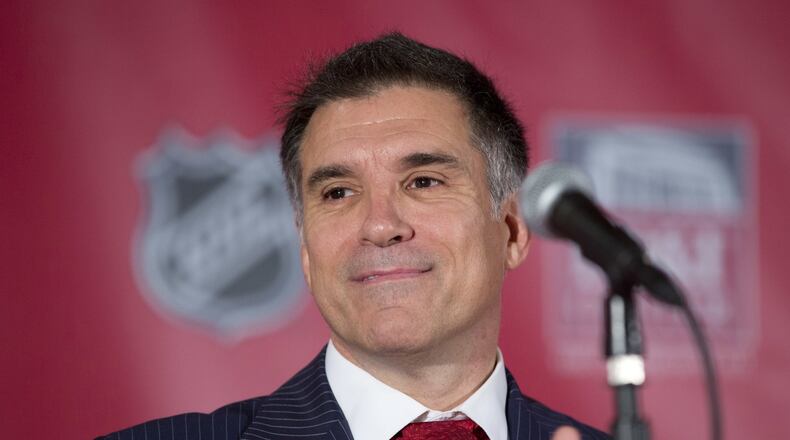Vincent Viola is the founder and executive chairman of the digital trader firm Virtu Financial, former chairman of the New York Mercantile Exchange, owner of the NHL’s Florida Panthers and philanthropist to Catholic charities.
In a statement, Trump cited Viola’s military and business background in nominating him for the Army’s top civilian post, saying the former Army Ranger “has proved throughout his life that he knows how to be a leader and deliver major results in the face of any challenge.”
FACEBOOK: Follow reporter Barrie Barber for the latest updates and military news
Fanning, a former interim and undersecretary of the Air Force who toured Wright-Patterson Air Force Base in his tenure, was named secretary of the Army in May. The 1986 Centerville High School graduate with a history degree from Dartmouth College was the first openly gay person to serve as secretary of the Army. Fanning, a former deputy undersecretary of the Navy, also was chief of staff for outgoing Secretary of Defense Ashton Carter.
“His connection was brief with Dayton and it gave him a familiarity with the community and I think it gave the community a sense of having on of ours in a high position of leadership,” said Michael Gessel, Dayton Development Coalition vice president of federal programs. “He was a star within the Defense Department and very well respected in the Air Force community.”
Credit: DaytonDailyNews
If confirmed by the Senate, Viola will take over as civilian leader of an Army struggling to recoup and recapitalize after more than 15 years at war. Under current plans, the Army would continue to downsize from a high of about 570,000 soldiers at the peak of the Iraq war to 450,000 by 2019.
“A primary focus of my leadership will be ensuring that America’s soldiers have the ways and means to fight and win across the full spectrum of conflict,” he said in a statement.
U.S. Rep. Mike Turner, R-Dayton has introduced legislation to boost Army troop strength. Legislation not yet finalized for the next budget year would stall the draw down at 476,000 soldiers compared to the present size of 470,000 soldiers.
As secretary, Viola would be responsible for management, budget, acquisition, personnel and base issues for a vast network of about 150 permanent installations around the world. Army soldiers are deployed in about 140 countries.
PREVIOUS STORY: Senators question Centerville grad chosen to lead Army
“It’s clear that the president-elect has a framework for what he wants in senior officials,” said Loren B. Thompson, a senior defense analyst at the Lexington Institute in Virginia. “They need to have proven themselves in politics or the business world and in the case of appointees they need to have military service experience.”
Thompson added, Viola “certainly understands the Army better than some of the recent officials who have not served,” he said. “This is kind of the problem with the Obama years. They put people with no military experience in charge of large military organizations and there’s sort of an intellectual …. disconnect between the people on the top and the people in the trenches.”
Credit: Susan Walsh
Credit: Susan Walsh
In his high-ranking civilian leadership posts at the Pentagon, Fanning was in the midst of sequestration or handling automatic spending reductions.
In an interview with this newspaper in 2013, he said the “real pernicious effect of sequestration” was “lack of flexibility” in across-the-board cuts. He said the temporary furloughs then of tens of thousands of civilian civil service workers were “the hardest and worst decision” made in fiscal year 2013.
Gessel and Dayton area leaders met Fanning in a visit to Washington, D.C., at the time. “I think he was a very bright and energetic leader,” Gessel said. “He was captivating and was clearly knowledgeable and forthright about Air Force programs and certainly knowledgeable about Wright-Patterson.”
The Associated Press contributed to this story.
About the Author

